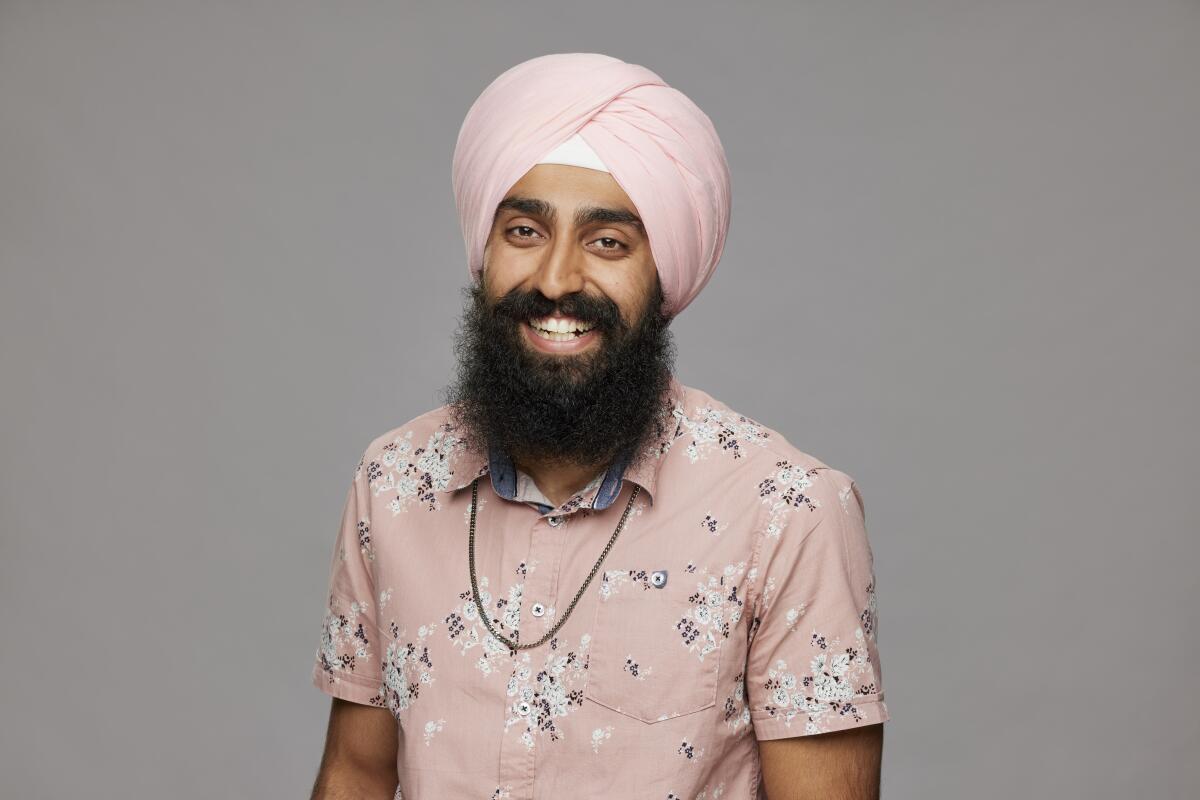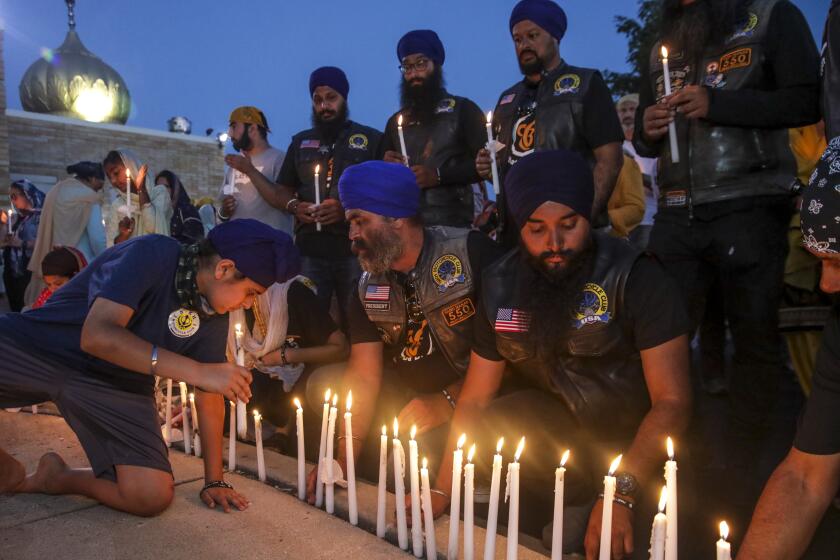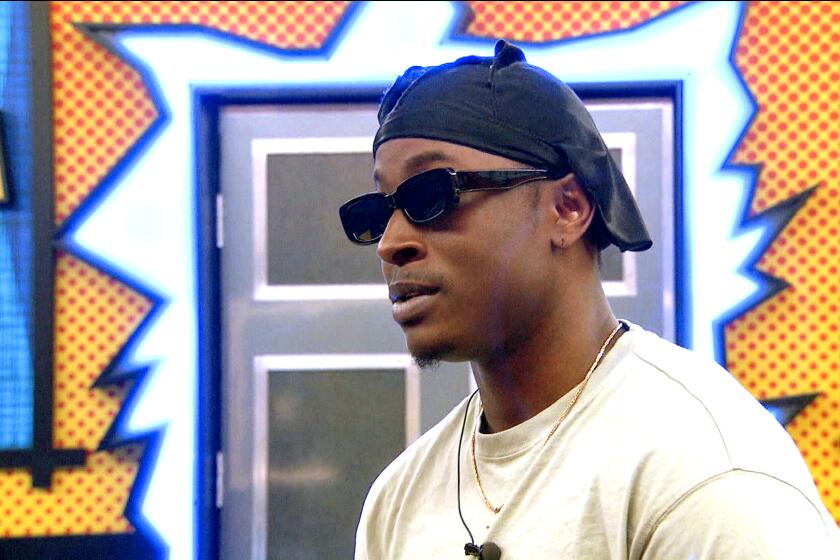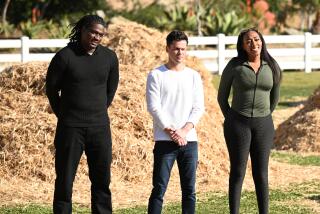Jag Bains makes ‘Big Brother’ history as its first Sikh and Indian American winner

- Share via
Jag Bains has made “Big Brother” history, becoming the first Sikh and Indian American winner in the show’s 25-season run.
The 25-year-old truck company owner from Omak, Wash., outlasted Matt Klotz, 27, a Deaflympics swimmer and the first deaf contestant on the show, and Bowie Jane Ball, a 46-year-old Australian DJ and barrister, to cash in on the $750,000 prize. All three made it to Thursday’s finale, but in the end it came down to Bains and Klotz. With a fiery speech, Bains won over a jury of seven eliminated contestants, who voted 5-2 in his favor.
“I didn’t think I was going to make it this far in the game and that I was going to win,” Bains told Entertainment Weekly shortly after his victory. He is the first Sikh contestant on the show, and is also the first winner of Indian origin, with his parents having immigrated from the Punjab region.
“But what I will say is everything I do is for my family,” he continued. “My parents immigrated to this country and they sacrificed everything to give me the life that I have. And so all of this is for them. All of this is for my family and that’s what I do know.”
Here’s what happened when a Sikh motorcycle club planned a ‘ride against hate’ across the country, hoping to educate the public about their culture
With Bains’ victory, the CBS reality competition show has had three straight barrier-breaking victories. In 2021, the show named its first Black champion, Xavier Prather, a Milwaukee-based attorney, and last year, Taylor Hale, a former Miss Michigan USA, became the first Black woman to win.
But the slate of historic wins came only after multiple waves of allegations of racism, homophobia and other forms of hostility among contestants on the show. Since its debut in 2000, the vast majority of casts, which pack the “Big Brother” house for months of competition, have been made up of white contestants. Some of them have been caught on camera yelling racist taunts at Black and Asian contestants.
In Season 21, Jack Matthews, a white contestant, told Kemi Fakunle, the season’s only Black woman in the house, that he would “like to stomp a mud hole through her chest.” He also used “rice pudding” when referring to an Asian American contestant. He claimed his comments were “playful” and not racially motivated.
As “Big Brother” enters its Season 21 finale, the reality show’s history of contestants using racist language once again raises questions about CBS’ diversity push.
In 2013, Aaryn Gries said in a reference to Black house guest Candice Stewart: “Be careful what you say in the dark, might not get to see the b—.” Gries had also flipped over Stewart’s mattress and her with a stereotypical Black accent. At another point, Gries said to an Asian American contestant, “Shut up, go make some rice,” and used a homophobic term to describe another house guest.
In 2016, Andrew Tate — who had not yet reached his current level of online fame — was kicked off the show after a series of homophobic and racist tweets surfaced, along with a video that appeared to show Tate hitting a woman. He claimed his actions with the woman were consensual. Tate, who is facing charges of human trafficking and sexual assault in Romania, went on to become a popular self-help guru, a dating and finance savant to his fans, and a misogynistic paragon of toxic masculinity to his detractors.
With all of that baggage, and in response to renewed calls for change in representation across the entertainment industry after the 2020 murder of George Floyd, CBS Chief Executive George Cheeks pledged to increase representation of Black, Indigenous and people of color to 50% of the casts of its unscripted series, including “Big Brother.”
A contestant who admitted to using a derogatory word for people with disabilities remains in the house one month after another was ousted for offensive language.
But issues remained. Just this past season, Luke Valentine, a white contestant, was expelled from the house after the Florida artist used the N-word during a casual conversation with other contestants. And later in the season, Jared Fields, a Connecticut-based exterminator, admitted to using a derogatory term for people with intellectual or developmental disabilities in reference to another contestant, medical receptionist America Lopez.
Bains told EW he was fully aware of the burden of being another “first” on the show amid the backdrop of its diversity issues. He also felt the pressure of representing his community.
“I think coming into the game and throughout the game I’ve had that weight,” Bains said. The show is designed to pit contestants against one another, which proved challenging to Bains, whose values of loyalty, service and honesty were challenged. After he was given a second chance following an eviction from the house, Bains said he reconciled the conflict by deciding to be loyal, but only to Klotz. Their alliance became known as a bromance among fans.
“I know I felt it at the beginning of the game — I sucked — I was loyal to a fault,” he said. “And what I realized is that if I’m loyal to everyone, that means I’m loyal to no one. And I decided I can’t play that game. I can’t represent my entire community. I can only represent myself and in the best light possible and hope that it portrays my community in a positive light.”
Times staff writer Greg Braxton contributed to this report.
More to Read
The complete guide to home viewing
Get Screen Gab for everything about the TV shows and streaming movies everyone’s talking about.
You may occasionally receive promotional content from the Los Angeles Times.








